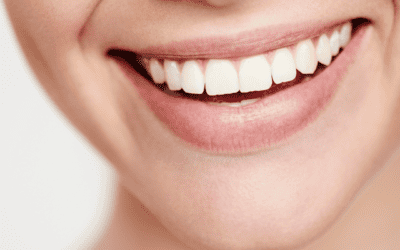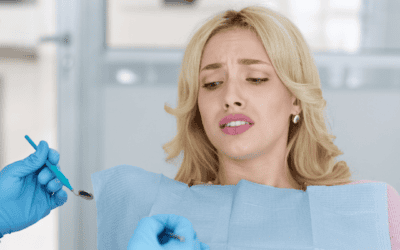Our oral and dental health is important throughout our life, but at different ages and stages of life, different aspects of our health matter. The following blog will talk through the main points of what’s important at each stage in our lives.
Early childhood
Getting your child in good dental habits from a young age is crucial. Dental disease has been described as a disease of childhood as good habits from a young age could prevent a lifetime of disease, pain and dental discomfort.
You should start caring for your child’s teeth from when they are a baby:
- Brush your child’s teeth twice a day. You should start from when the first tooth comes through and continue to help them with brushing until they are around 7 or 8 years old.
- Use the age-appropriate toothpaste such as Macleans Milk Teeth which is designed for 0 – 3 year-olds.
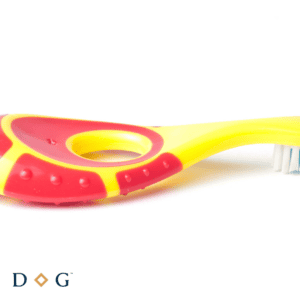
When should I take my child to the dentist?
It’s best to get your child used to dental visits from a young age, ideally before they turn two. If you’re going for a regular dental appointment – take your child along with you, so that they can see that it’s nothing to worry about. Kids mimic and copy their parents – if they see you sitting in the chair, not scared and not in pain, they will do the same. Make going to the dentist a positive experience – make it fun and make a day of it. Many of our families combine their dentist visit with a day in Brisbane City, a trip to the museum or even Southbank.
If you are nervous – try not to show this as your child will pick up on it. If you are very nervous and can’t hide it, it might be better to get someone else to take them along.
At their appointment, the dentist will check on the tooth development and that everything is progressing as it should. They will also be able to give you tailored advice about toothbrushing and diet. They can show you how to effectively brush and floss your child’s teeth.
For further tips on preparing for your child’s first dental appointment, check-out Dental checks for young children by The Better Health Channel.
3 – 7 Years Old
Continue to help your child brush their teeth and add in some flossing!
- Use a small amount (pea-sized) of fluoridated toothpaste, and make sure they spit out (don’t swallow).
- Brush for 2 minutes – this is enough time to get around all the surfaces of all the teeth.
- Try to make toothbrushing fun – make it a game, have a toothbrushing chart, use a two minute timer, or brush to their favourite song. There are plenty of toothbrushing apps too.
- You should floss your child’s teeth as soon as they have teeth touching. Aim to floss every day. Their dentist can also give them a flossing demo and tips to make it easier. One of the easiest ways to floss kid’s teeth is to use floss picks, which have a handle for ease.
- At age 7 or 8 the dentist will also be checking that the adult teeth are coming through in the correct position. If there are any anomalies, they may do an early referral to an orthodontist.
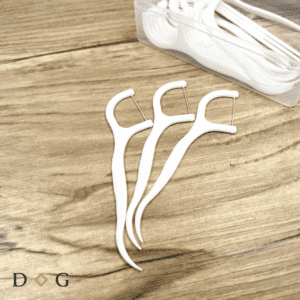
Why Baby Teeth Matter
Many people wrongly believe that baby teeth aren’t important as they fall out. However, they are important for a number of reasons:
- The baby teeth make way and guide the position of the adult teeth. Early loss of a baby tooth (due to tooth decay or trauma), can affect the position of the adult teeth as they come through. This can result in the need for orthodontic treatment.
- Healthy baby teeth also play a huge role psychologically and socially for your child. Teeth play a role in the development of speech and give kids confidence to smile and speak. They also help with eating and nutrition.
- Decayed baby teeth will eventually cause pain. This leads to days off school, loss of appetite, loss of sleep and unscheduled trips to the dentist for treatment, which can be upsetting for young children.
- Finally, if there are decaying baby teeth in the mouth when adult teeth start to come through, there is more chance of the adult teeth developing decay also.
Age 8+
- By age 7 or 8 your child may be able to brush their teeth by themselves – if they are able to tie their own shoelaces, they likely have the dexterity to clean their teeth
- However, we always recommend periodically checking how they are doing.
- Once your child is 10 or so, they should have the dexterity to floss their own teeth.
- As the rest of the adult teeth start to come through, regular examinations will not only check the teeth and gums, but also check the position of the teeth and how they bite together.
- Kids playing contact sports may want to think about mouthguards – to protect their adult teeth from trauma
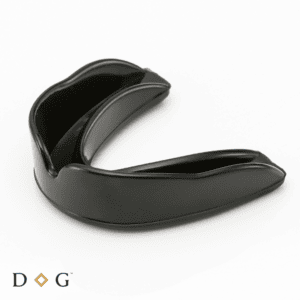
Early adulthood
This can be a crucial time for dental health. As young adults start to leave home and make their way in the world they can:
- Develop unhealthy eating habits
- Not be as diligent with their oral hygiene
- Stop attending the dentist when their parents aren’t around to remind them/they are no longer on their parent’s private health
This can also be the time when wisdom teeth start to give issues. If there is not enough space for these teeth to come through, they can become impacted which can lead to pain, infection, swelling and possibly decay in the wisdom teeth or adjacent teeth.
It’s therefore crucial for young people to keep up those regular dental appointments, to help prevent problems in the future.
How stress affects our mouth
Late teens, early adulthood and beyond can be a stressful time. Stress can cause mouth ulcers and cold sores. There are other causes of ulcers so if you are suffering from many ulcers at once, frequently have ulcers or have an ulcer that’s not healing within 10 days, please schedule a visit to your dentist. Iron deficiency is a common cause of ulcers in women.
Stress can also cause us to tense the muscles around our shoulders, face and neck, leading to headaches and jaw pain. We can grind or clench our teeth, which a lot of the time we do subconsciously, or even in our sleep. This can cause wear and damage to the teeth, and even affect the jaw joint, which can be very painful. Getting a proper diagnosis and treatment is important. The treatment can be as simple as some exercises for your jaw, some treatment from a physio and/or a mouthguard to help protect your teeth from the effects of grinding.
Pregnancy
It is completely safe to visit your dentist during pregnancy. In fact is actually more important to do so. It’s important not only for mum’s health, but also for the health of the baby.
Hormonal changes during pregnancy can make gums more prone to inflammation, bleeding, and swelling – what we call pregnancy gingivitis. Excellent home care of your teeth through twice daily brushing, and daily flossing can help control this. Also seeing your dentist for a professional clean will help. Left un-checked it could develop into gum disease and cause further problems.
Studies have shown links between mother’s having gum disease and effects on the birth and the baby. For example, American Nurse reports a study that showed women who had severe gum disease which was left untreated during pregnancy were more susceptible to early labour. Gum disease has also been linked to low birth weight and preeclampsia.
Diet and Morning Sickness
Morning sickness can be very damaging to teeth. This causes an acidic environment in the mouth , which lowers the pH level in the mouth. This acid causes tooth erosion, which is basically when the tooth starts to dissolve. As the enamel becomes thin, the teeth can become more sensitive to hot and cold. Thin enamel is more prone to chipping and breaking. In very severe cases, the nerve inside the tooth can be irreversibly damaged.
If you have been sick, don’t brush your teeth afterwards. The acids will have softened the tooth surface and the brushing action could abrade and damage the teeth further. Instead, drink water and rinse with a fluoride mouthwash to help protect the teeth. Other things that help return the acid levels in the mouth to neutral are milk, cheese and yogurt – just look for low sugar options.
The other problem pregnant women face are cravings! Look for healthier options if you get that sugar craving. Increased sugar intake will lead to tooth decay. Try and stick to water and plain milk for drinks and fresh fruit and things like cheese and nuts for tooth friendly snacks.

Middle age and beyond
As we get older we may acquire more health issues or chronic diseases. Many diseases can affect your oral health and the treatment the dentist may carry out. This is why we love a full medical history when you come to visit us.
Not only does our general health affect our oral health, but our oral health can affect our general health. Poor dental health has been linked to:
- Diseases of the heart and blood vessels
- Diabetes
- Lung disease
- Kidney disease
- Stroke
- Dementia
- Adverse pregnancy outcomes
- Stomach ulcers
- Oral cancers
- Aspiration pneumonia in the elderly
The common link in most of these chronic diseases is chronic inflammation. Chronic inflammation in your mouth is not healthy for the rest of your body. However, we may have chronic inflammation in our mouths and not realise. That is why regular dental check-ups are important.

Mouth Cancer
Cancers of the mouth can affect anyone, but it is more common in men over 40 years old.
The main risk factors for mouth cancer:
- Tobacco
- Alcohol
- Viruses (human papillomavirus; Epstein-Barr virus)
- Poor oral hygiene and gum disease
- Family history of mouth cancers
- Exposure to the sun (cancers of the lip)
- Betel nut chewing
Signs of mouth cancer are often first picked up by your dentist. This is why regular dental examinations are so vital. Your dentist isn’t just checking your teeth, but also your gums and the soft tissues of your mouth for any signs of abnormalities. This is why your dentist will ask you to poke your tongue out – don’t worry, you’re not being rude!
Menopause
Hormone changes during menopause can lead to inflamed gums, burning sensations, altered taste sensations and a dry mouth. You may notice your gums look shiny, pale to deep red and that they bleed easily. Hormone changes can also cause burning mouth syndrome. This is where you feel your mouth is more sensitive to hot and cold, and things taste a bit strange.
Some women experience dry mouth during menopause. This can make eating, swallowing and speaking more difficult. The biggest risk for those with dry mouth is an increased risk of tooth decay and gum disease. Saliva in in fact incredibly protective of our teeth. It contains substances that help counteract acids and fight bacteria. It’s very important that you chat to your dentist about your dry mouth. They can recommend products to help not only with the discomfort, but also to protect your mouth from gum disease and tooth decay.
After menopause, many women can suffer with osteoporosis. This is when the bones become thin, weak and fragile. This can also affect the jaw bones. In addition, medications prescribed to treat osteoporosis can have an impact on the jaw bone and consequently healing following dental surgery. If you have been diagnosed with osteoporosis, it’s important to see you dentist. They can assess the bone levels surrounding the teeth and help prevent problems down the track.
Senior Dental Health
As we get older, chronic health conditions can make it harder for us to care for our dental health. Arthritis, stroke, Parkinson’s or general difficulty in gripping toothbrush handles and floss can make our home care routine more difficult. Your dentist has tricks and tips up their sleeve to help you maintain your oral hygiene. One of those is to try a toothbrush with a thick handle, or to modify toothbrush handles to make them easier to grip.
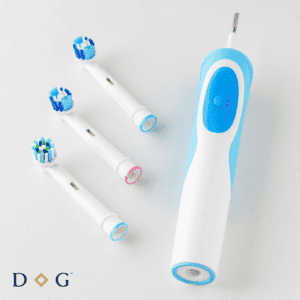
As we age, we also get recession of the gums – this can lead to an increase in tooth sensitivity. Tooth sensitivity is something that your dentist can help with at your regular examination appointments. They can also suggest toothpastes for sensitive teeth.
Side effects of medications can also lead to dry mouth. As mentioned above, this can be very damaging for the teeth and gums. Saliva is very protective and helps to protect our mouths from disease. In its absence, we are more prone to gum disease, dental decay and infections of the mouth. Your dentist can help with tips and tricks for dry mouth, and in increasing your preventive strategies, for example in providing high strength fluoride toothpastes.
Check out the Harvard Medical School’s guide to senior’s dental care for further information.
Main Takeaways
Whatever your age and life stage, your teeth and oral health are always important. As always, we are here to help, so if you are looking for specific advice or are long over-due a check-up, please get in touch.


